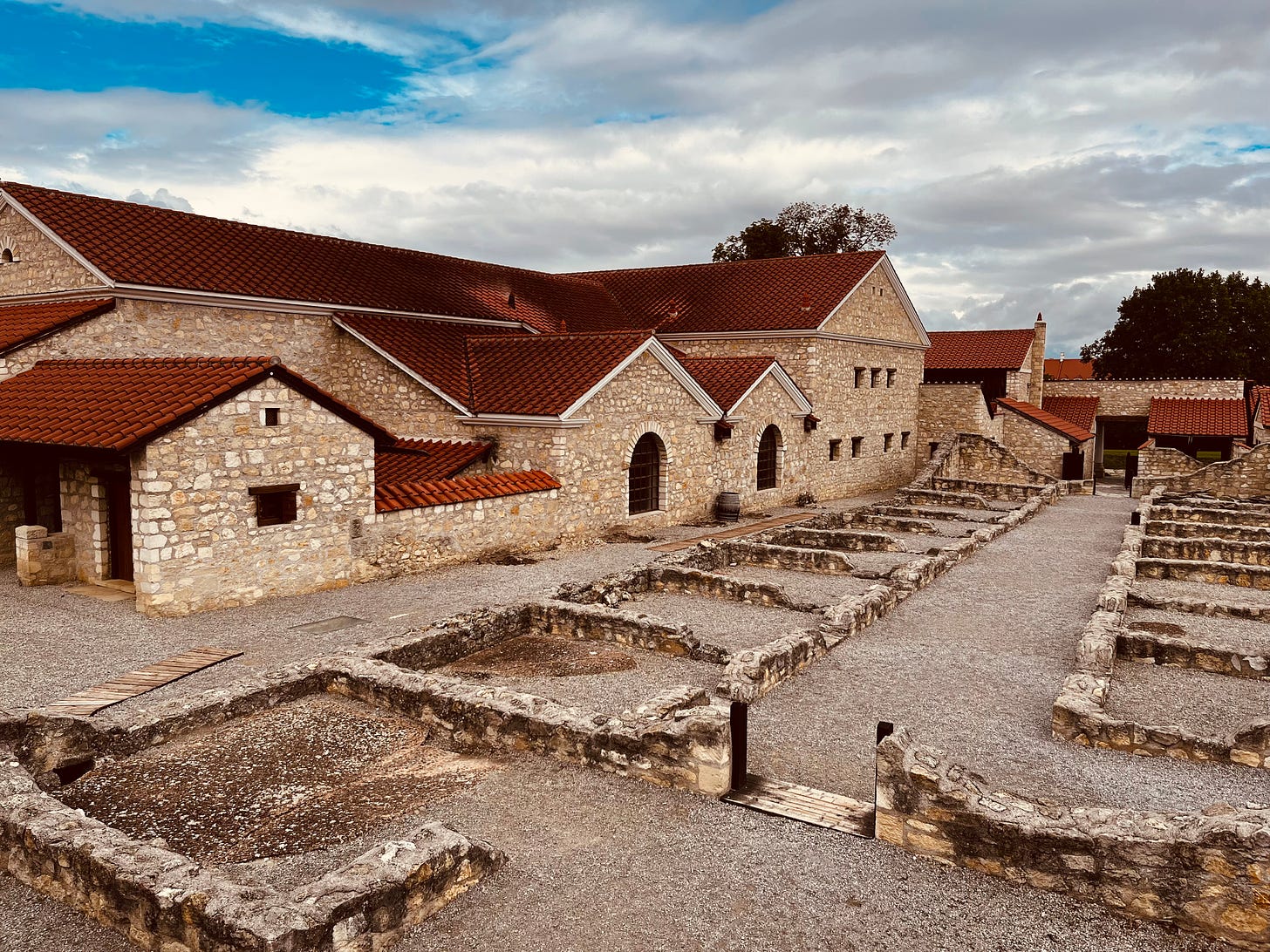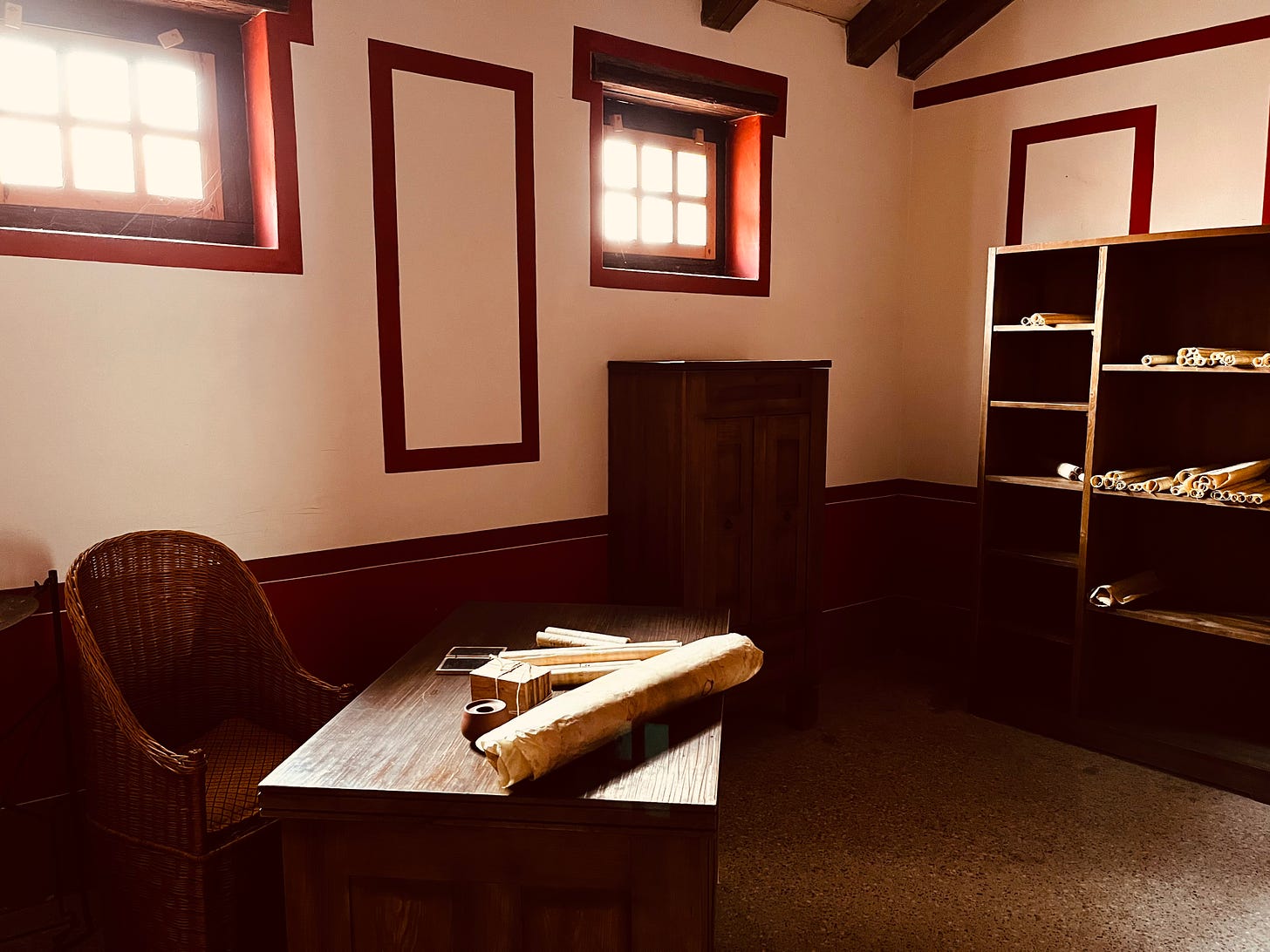On the steps of Marcus Aurelius: visiting Carnuntum
If you have a chance, go to Carnuntum, near Vienna, and visit the site where the emperor-philosopher Marcus Aurelius wrote some of his famous Meditations

Some people go to Mecca. Others to see the Pope in St. Peter’s Square. I go to sites that are connected to ancient Greco-Roman history, especially to philosophers, and more often than not in particular to Stoicism.
I call these episodes my “secular pilgrimages,” as they serve a function similar to what—I assume—is the function of a pilgrimage for a religious person. My dictionary provides the following helpful definition:
“Pilgrimage: a journey to a place associated with someone or something well known or respected.”
Mecca, officially known as Makkah al-Mukarramah, is one such important place because it was where the Prophet Muhammad was born around 570 CE. St. Peter’s Square, in the Vatican City, is where the Christian Pope regularly appears to the faithful to deliver messages of hope and charity. And Carnuntum is a location on the Danube River, between Vienna and Bratislava, where the emperor-philosopher Marcus Aurelius spent several years fighting the Marcomanni and other German tribes while writing parts of his Meditations.
It is there, to Carnuntum, that I had the opportunity to go recently, during a trip to Vienna to attend the 22nd Congress of the European Skeptics, where I delivered a talk entitled “Skepticism as a way of life.” It was my chance to walk in the steps of Marcus, and I eagerly took it.
In fact, walking is a lot of what I did there! About 20km, according to my Apple Watch. This is not because the site itself is that big—though it certainly spans quite an acreage—but because I didn’t have a car, and the train only gets you so far. There are six main sites at Carnuntum: the civilian city, the amphitheater, the triumphal arch, the gladiator school, a second amphitheater near the remains of the military encampment, and the museum. If you are considering a visit, keep in mind that the first four sites are near the town and train station of Petronell-Carnuntum, while the last two are located near the town (and train station) of Bad Deutsch-Altenburg. I recommend renting a bike to get around…
Carnuntum is a very unusual site, especially the remains of the civilian town. The archeologists have made a bold decision: they left some of the Roman foundations exposed as you would find them in any other similar site. But on top of some of the others they have rebuilt buildings as they were in Roman times, using similar materials and techniques, and adorning them with paintings and daily objects as indicated by the archaeological excavations. The result is stunning. The visitor can walk, for instance, inside a fully reconstructed Roman villa and poke around the atrium (open court), the culina (kitchen), the triclinium (dining room), the tablinum (study), and various cubicula (bedrooms). Talk about an immersive experience!
Marcus Aurelius was in Carnuntum from 172 to 175, fighting a defensive frontier war. He wrote an unknown number of entries of the Meditations there, as attested by the beginning of book III, which explicitly says: “Written in Carnuntum.” While I was there I looked up the first entry of book III, which struck me as profound and directly relevant to me:
“One must take into consideration not only the fact that life is being used up day by day and there’s less of it left, but also that, if one were to live longer, there’s no guarantee that one’s mind will remain unaffected and capable of understanding the way things are in themselves, or the concepts that guide one’s experience of matters both divine and human. The early symptoms of senility don’t involve the failure of things like transpiration, digestion, sense perception, or impulse; the first to go are abilities that require a well-trained mental faculty, such as making proper use of oneself, accurately estimating the limits of appropriate behavior, analyzing one’s impressions, and understanding whether the time has come to take your leave of this life. You must have a sense of urgency, then, not only because at each moment you’re drawing closer to death, but also because your understanding of the world around you and your ability to pay attention to it will come to an end before you do.” (Meditations, III.1)
Marcus died in 180, five to seven years after writing the above. He was 58, my same age. Earlier this year I ended up at the emergency room because of a sudden episode of “brain fog” that may or may not have been the result of a mini-stroke or a micro-seizure. I had a taste of what Marcus is talking about when he says that the signs of dementia are not about digestion or perception, but concern the way we use our mental faculties to make decisions. And for a Stoic—indeed, I would argue, for a human being—our mental faculties define who we are. When they are affected, we are no longer the same person, and if they are profoundly affected we are no one at all, even though our physical body may still technically be alive.
What do we need our mental abilities for? Marcus spells it out: making proper use of oneself, accurately estimating the limits of appropriate behavior, analyzing one’s impressions, and understanding whether the time has come to take leave of life.
To make “a proper use” of oneself means to live as a cosmopolitan, a member of the universal human family, and therefore to act prosocially, treating other people—regardless of whether they are your friends and relatives or they live on the other side of the world—as you would like to be treated, with fairness and respect.
To have an accurate estimation of the limits of appropriate behavior translates into doing things that, as Marcus writes elsewhere in the same book of the Meditations (III.7), do not require a curtain, i.e., can be done in the open, without shame.
To analyze one’s impressions means to critically reflect on our instant judgments, pausing and taking time to see whether they are, in fact, accurate. Do you see an attractive person of the right gender for you passing by? Is your first thought that it would be nice to have sex with them? That’s normal. But before you act remind yourself that you are in a committed and loving relationship, and that betraying your partner’s trust is not the kind of thing that a good human being would do.
Finally, to understand whether the time has come to leave life is to assess whether we ought to walk through what the Stoic philosopher Epictetus—who was a major influence on Marcus—called “the open door.” For the Stoics the option of committing suicide was the ultimate root of our freedom. As Epictetus says, if the room has too much smoke then I’ll leave. Conversely, if I decide to stay it means that I can take the smoke and that I think it’s worth doing so.
These four aspects that characterize our faculty of judgment are, ultimately, what makes our life worth living. Hence Marcus’s sense of urgency to live life here and now, to appreciate every moment we have because it is one of a finite number. And we don’t know when the last such moment will be.
I was thinking along these lines while walking around Carnuntum, and realized that there is, of course, much more to the place than just a pilgrimage destination for people who are into Stoicism and Marcus Aurelius.
Carnuntum is first heard of during the reign of Augustus, the first Roman emperor, because his stepson, Tiberius, made it his base of operations at the frontier with Germania. It became the station for a succession of four roman legions, ending with Legio XIV Gemina, which moved to Carnuntum in 117-118 CE and staid for three centuries, until the frontier eventually collapsed in 430 CE.
Although my interest in the place had to do with Marcus’s stay, Carnuntum is arguably more, or at least just as famous for a meeting that took place there in 308 CE. The conference of Carnuntum, which was pivotal for the fate of the empire at the time, was chaired by the retired emperor Diocletian. (Did you know emperors could retire?)
Diocletian attempted to come up with a stable political system to help avoid a repetition of the crisis of the Third Century, which almost destroyed the roman empire. During the crisis there were as many as 26 claimants to the title of emperor, and the situation was resolved only thanks to the military victories of Aurelian and later the political reforms enacted by Diocletian.
One crucial reform was the institution of the tetrarchy: two senior emperors (Augusti) would rule the eastern and western parts of the empire, each assisted by a senior emperor (Caesares), who in time would succeed the Augusti. It wasn’t a bad idea, on paper, as it acknowledged that the empire had become too large for a single person to administer it, and it also set up an orderly and stratified succession.
The problem was that when one of the two reigning Augusti, Constantius, died in July 306 CE, his son Constantine declared himself both Augustus and Caesar. That led to, shall we say, some tension within the tetrarchy, hence the conference at Carnuntum as an attempt to smooth things over.
It didn’t go very well: the agreement arbitrarily declared one of the contenders, Maxentius, a usurper, though in reality he was no more of a usurper than Constantine. Since Maxentius was militarily powerful and controlled Italy and Africa, the situation quickly devolved into a series of full fledged civil wars. Eventually, Maxentius was defeated by Constantine at the famous Battle of the Milvian Bridge, and since Constantine had fought with an army bearing a Christian insignia, this was for all effective purposes the beginning of the end of the Roman Empire.
So here I was, in a place that simultaneously prompted me with very personal reflections on the meaning of my own and of human life in general, and yet also reminded me of large scale events that affected the lives of millions of people for decades and possibly centuries. Quite a bit to chew over on the train ride back to Vienna, where some friends were waiting for me to go sample local schnitzels, accompanied by some nice dry Riesling. As I said, you really need to consider visit the area.





This is beautifully well written. Thank you.
I'll endeavor to visit while I'm able.
Thanks for reflecting on your latest worthwhile visit and, then, bringing it to readers. To judgement, which too many people disdain!